« June 2012 | Main | August 2012 »
July 30, 2012
The Bunny Game

Adam Rehmeier - 2010
Autonomy Pictures Region 0 DVD
I can't write about this film without making some other connections that may seem very tangential. But I will come back to write more specifically about The Bunny Game.
First, the shadow of Aurora, Colorado is still in the media and in my life. Keep in mind that I live a few miles away, so this was local news. And since that time various pundits have discussed how responsible film is for inspiring the shooting. One person indicted Warner Brothers based on their Depression era one-two punch of Public Enemy and Little Caesar. And a few years ago, I wrote about a German film about a rapist. My ex was visiting me, and got hysterical watching the first few minutes. Even though the film was about a man who was arrested and was challenging himself to reform his life, the fact that rape was depicted was considered too much for my ex. Her argument was that any form of depiction of rape potentially would inspire a viewer to commit such an act. It was a challenge for me just to keep her from destroying the DVD so I could write about the film later. As far as anti-social activity on the screen goes, I saw again The Great Train Robbery. A gang steals money, shoots unarmed guys dead, and in the most famous image, one of the robbers aims and shoots his gun at the audience. The movie was made in 1903. Yes, over a century ago. Edwin S. Porter may have been inspired by a British movie made earlier that year, A Daring Daylight Robbery. Both films have been considered inspirational . . . to other filmmakers. My own feeling is that the people who get the most upset or pontifical about violence in film usually have at best a very casual knowledge of film history.
I'm also reading Behind the Pink Curtain, a history of Japanese soft core sex films. One thing that is striking is the sub-genre of films involving sado-masochism and bondage within the Japanese industry. Keep in mind that these are films that played in movie theaters primarily in the Seventies and Eighties, and that some of the people involved moved on to mainstream careers. What I have not read in Jasper Sharp's book is any indication that women were in any way violated as a result of someone watching any of these movies, at least not in Japan. Whether one considers a movie like Red Rope or Flower and Snake entertainment is besides the point. Had there been any rapes or abductions inspired by these films, government forces would have certainly intervened.

Which brings me to The Bunny Game. And I did feel much trepidation when I read the synopsis. Basically, a prostitute is abducted and tortured by trucker. The film is also inspired at least partially by the life of the Rodleen Getsic, who shares screenplay credit with director Adam Rehmeier, and also plays the woman in trouble. Getsic and Rehmeier consider their work to be a horror movie. Whatever one wants to make of that, or any other label, the effect is more of confrontation than titillation.
There is no gore. Except for a couple of scenes of branding, and shaving off of hair, the damage inflicted is overwhelmingly psychological rather than physical. In a larger sense, what I think The Bunny Game is about is male power and female commodification. The prostitute, Sylvia Gray, virtually advertises who she is with her bleach blonde hair, cheap and flashy clothing, and fishnet stockings. All that's missing is a portable neon sign pointing to her, with the words, "Cheap sex here". We first see Sylvia performing a blow job. Sylvia is available for whatever comes her way, be it oral sex behind a dumpster, or rough sex in a shabby motel. Sylvia's life seems to consist of street pickups, snorts of cocaine, brief feelings of remorse about her life, and a repetition of the cycle. One of the customers beats and robs Sylvia. One might dismiss such an incident as simply the perils of the trade, but one might also consider such a scene as indicative of how men use their power to rationalize mistreating not only prostitutes, but women in general.
The abduction of Sylvia by the trucker known as Hog, At one point, Hog and Sylvia wear leather masks of a big snouted hog and floppy eared bunny. Sylvia is chained to a wall in Hog's truck. The relationship between the two is about power, and how Hog uses his power over Sylvia. Rather than banging her, Hog would rather bang a hammer around Sylvia's immobile body, intimidating her with the threat of physical violence.
As Sylvia Gray, Rodleen Getsic is mesmerizing. She's garish and cheap looking, and I couldn't take my eyes off her. There are two tufts of hair above her ears that almost look like substitutes for animal ears. A remarkable moment is a scene after a session of rough sex when Sylvia takes a shower. She's briefly seen with the heavy eye makeup washed away, looking towards a window, with her hands clasped in front of her, as if she was praying to somehow escape from her current life. Getsic performs with very little dialogue, but a very expressive face.
The film also is visually striking. The actual filming took place in 2008, and completed in 2011. Shot in black and white, according to the commentary track, Adam Rehmeier was able to do most of the film in single takes. An accomplished cinematographer and second unit director, there is little to argue with in his choice of compositions. Because of the technical skill, visually this doesn't look like the dashed off work of someone like Ed Wood or William Beaudine. Most of the film is made of quick cuts. What exists of a narrative was actually improvised during the course of filming. The overall effect makes The Bunny Game look more like an "undergound" movie or European art house film from the Sixties.
There may be arguments about the value of The Bunny Game, about what's on the screen as opposed to any intentions of Getsic and Rehmeier. What can't be argued is the searing screen presence of Rodleen Getsic.

Posted by Peter Nellhaus at 08:55 AM
July 29, 2012
Coffee Break

Taryn Power in Tracks (Henry Jaglom - 1976)
Posted by Peter Nellhaus at 08:38 AM | Comments (1)
July 28, 2012
Heaven Strewn

Jeremiah Gurzi - 2011
Cinema Libra Studios All Region DVD
I'm not sure if Heaven Strewn would qualify as contemporary film noir, at least in the way that the genre is generally understood. What is more certain is that there is are threads of inspiration, primarily from John Huston with his stories of men losing everything, or almost everything, to pipe dreams. More specifically, when Mickey and Jasper go out to the desert in search of their own lucky strike, I couldn't help but think of Treasure of Sierra Madre.
Mickey and Jasper have been friends since childhood, and have a history of getting into trouble when together. Mickey is currently trying to get by as counterfeiter. Jasper is a freelance journalist unable to meet a deadline due to writer's block, or perhaps simple inertia. Bonding again at a meeting for recovering alcoholics, Mickey, with a couple of DUIs and an impounded car, talks Jasper into going on a road trip to the desert in search of valuable space meteorites. The two are the only ones in an otherworldly stretch of desert, when another car appears in the distance. A big convertible shows up with three equally big men who stop to bury something in the sand. Mickey goes down to the spot where the trio stopped, and digs out a suitcase full of money. As can be expected, trouble follows Mickey and Jasper.

Filmmaker Jeremiah Gurzi made the unusual choice to shoot his film in wide screen 16mm. As is stands, this also represents a one time use of the format as filmmaking becomes more exclusively digital. What is also of interest is that unlike many filmmakers who would use 16mm to film handheld, Gurzi chooses often static, carefully framed and lit shots. In this way also, Heaven Strewn also recalls more classic movies. Even though this is Gurzi's debut feature, the difference is that he not only has made several short films, but has worked on the more technical end of other productions, either in lighting or cinematography.
The real star of this movie would be the location of the Trona Pinnacles. It's the kind of setting that upstages the actors because it is so unnatural looking. Unlike Monument Valley which simply is imposing, Trona Pinnacles looks like the kind of place where sentient beings of any kind do not belong. The actual stars, Wyatt Denny and Rob Tepper, look like the kind of guys one would pass on the street without much notice. On the other hand, even from a distance, the criminal trio of Magdaleno Robles Jr., Robert Zepeda and Robert Larabee manage to look menacing, the kind of guys one gives a wide berth to when seen walking the street.
Save for the smashing of a truck window, there is no onscreen violence. What lingers is the threat of violence, and the sense that the trio is going to do whatever it takes to get their money back. It may be an old fashioned notion to suggest rather than to show in a film such as this. When Gurzi's badass three are on the loose, there is a palpable sense that whatever they are capable of could well be worse than what is imagined.

Posted by Peter Nellhaus at 08:33 AM | Comments (2)
July 26, 2012
Sacrifice

Zhao shi gu er
Chen Kaige - 2010
Samuel Goldwyn Films
I was hoping that Sacrifice would mark a return to form for Chen Kaige. It's a return to U.S. screens, if nothing else. Chen's last film was Forever Enthralled (2008), which from the clips I've seen had Chen return to the subject of the Chinese Opera, the basis for his most popular film, Farewell, My Concubine. No one has been enthralled enough to even provide that film with a stateside DVD release. Before that, there was The Promise, heavily edited from its original running time, and released when the bottom fell out on Chinese epics trying to cash in on the success of Crouching Tiger, Hidden Dragon.
The story isn't entirely unique, yet the film might have been more effective had Chen trusted his story more, rather than letting some elliptical editing and special effects get in the way. The film is based on the 13th Century Chinese plays "The Orphan of Zhao". A feudal lord's prank backfires, and a top general, Tu'an Gu, is forced to take the blame. Seething already at taking a back seat to the lord's brother-in-law, Zhao, Tu'an Gu creates an elaborate plot to frame Zhao for killing the lord, in turn decreeing that all Zhao family members are to be killed. Zhao's wife, Zhuang Ji, entreats her physician, Cheng, to save her newborn baby, the last surviving member of the Zhao family. Cheng does so, but at the expense of the life of his own baby son. With the baby raised as his son, Cheng concocts his own plan for revenge.
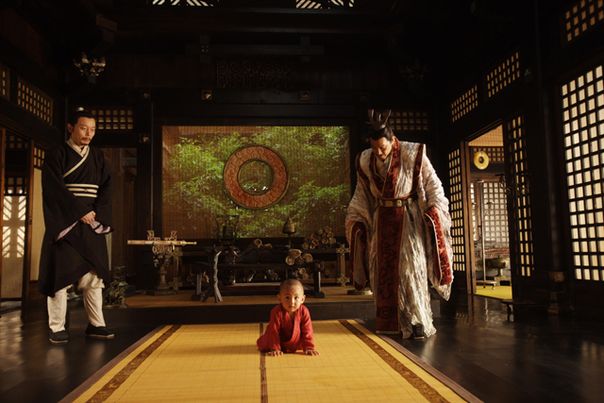
Nothing is entirely clear cut. Revenge and loyalty, whether familial or political, cut both ways. Tu'an Gu is not entirely villainous while Cheng is not entirely virtuous. The two men act out a battle of wits, with Cheng acting as Tu'an's physician. During this time, the boy, named Bo, is in a sense raised by both men, with Tu'an referred to as "Godfather" by the boy he assumes is Cheng's natural son.
The film might have been more effective had Chen allowed for a straight-forward, chronological narrative, as well as the presence of one of China's most popular stars, Ge You. Instead, Chen feels the need to gussy things up with some unnecessary cross cutting between past and present. One of the big battle scenes is shot and edited in such a way that there is no clear sense of the action, as if Chen has decided to make the mistakes of too many western filmmakers, rather than do what so many Chinese language filmmakers do right. A bit of slow motion here, and some acrobatics there add to the diminishing returns. Someone like John Woo or Peter Chan finds the balance between the epic and the intimate. With the exception of Emperor and the Assassin, Chen's best work has been the smaller scale Temptress Moon and Together.
Sacrifice has proven to be a commercial return for Chen where it was the third most popular film of the year. The two films more popular, Let the Bullets Fly and If You are the One 2, also starred Ge You. For those still unfamiliar with him, Ge You combines the star power that Tom Hanks had until recently, with the kind of everyman look of Ernest Borgnine. Sacrifice serves as a better showcase for Ge's talents than Let the Bullets Fly where he was overshadowed by Jiang Wen and Chow Yun-Fat. Still, the film made me feel that Chen Kaige, once part of the vanguard of mainland Chinese cinema, has allowed himself to instead chase after filmmaking trends.
Posted by Peter Nellhaus at 08:59 AM
July 24, 2012
My Way

Kang Je-kyu - 2011
Well Go Entertainment Region 1 DVD
If there was one Korean film director who might be most suited for trying his hand at with a Hollywood blockbuster, it would be Kang Je-kyu. His box office success, Shiri, about a North Korean hit women sneaking into Seoul, compares favorably to the original Die Hard, made for a fraction of the cost. Tae Guk Ki, his epic about the Korean war from the perspective of two brothers, was notably inspired by Steven Spielberg's Saving Private Ryan.
Spielberg is recalled again with this new film, which concluded dramatically during D-Day, from the point of view of a Japanese and Korean soldier who find themselves fighting on behalf of the German army. The origins of the film's story begin with this photograph of a Korean soldier in German uniform, captured at Normandy. The story is a fictionalized account that also serves as an investigation on the concept of national identity, and maintaining one's humanity during wartime.
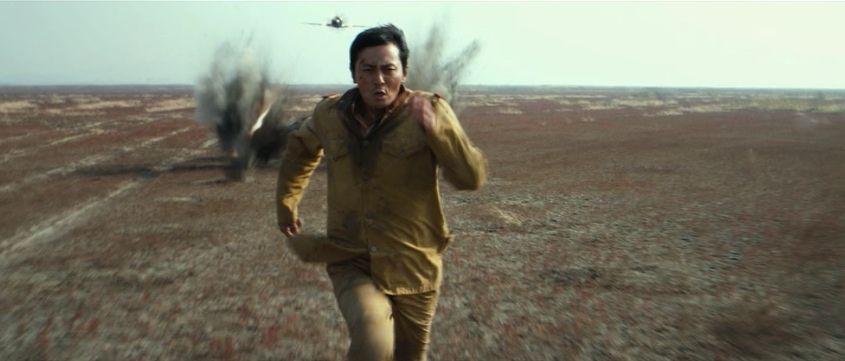
The film begins sometime during the late Twenties or early Thirties, when Japanese rule over Korea has been well established. Jun-shik, the son of a servant at the household of a Japanese military leader, meets Tetsuo, the grandson from Tokyo. The two boys establish alternating friendship and rivalry over their skills at running. Given the chance to compete in the Olympics, Jun-shik's clear victory is denied by the Japanese judges. Following a riot by the protesting Koreans, Jun-shik, along with several friends, is forced to fight on behalf of the Japanese army. While posted near Mongolia, Jun-shik's newest commanding officer is Tetsuo.
For Jun-shik, history repeats itself. Seeing the hollowness of slogans of fighting for a country that considers him a citizen for military purposes only, he sees no value other than to try and survive, when as a prisoner of war, he fights for the Russians, and again for the Germans. At the same time, when he could have easily allowed himself revenge for all of the mistreatment done personally by Tetsuo and by other Japanese soldiers, Jun-shik helps Tetsuo survive the war. The Korean prisoners are marginally treated better than the Japanese in the Russian camp. One of Jun-shik's friends is the top Korean in the camp, taking advantage of his position, and taking a Russian name. Again, what is addressed is relative power, or the illusion of power, during war.
While Kang seems to glide past the heart of what motivates Jun-shik to hold onto his humanity, there is no doubt that Kang has a great eye for spectacle. One of the great set pieces is of Jun-shik, in the process of escaping the Japanese fort, discovering a large number of Soviet tanks rumbling towards him. A Soviet airplane chases after Jun-shik. A couple of shots will bring to mind Cary Grant chased by the cropduster in North by Northwest. The pursuing plane is shot down by a female Chinese sniper with one single, well aimed bullet. The flaming remains of the plane come hurtling towards the audience. What Kang excels at is an effective visceral entertainment.
It needs to be understood that it has only been in the past few years that Korean films have looked at the years of Japanese occupation. One of recurring themes that unites these films is the meaning and expression of national identity. Spanning a period of almost two decades, and two continents, My Way is more broad than deep. Still, it is worth seeing for the many emotionally charged moments, inspired as it has been, from one of the more unusual footnotes of World War II.

Posted by Peter Nellhaus at 08:42 AM
July 22, 2012
Coffee Break

Robert Taylor in Undercurrent (Vincente Minnelli - 1946)
Posted by Peter Nellhaus at 08:12 AM
July 19, 2012
Facing Mirrors

Aynehaye Rooberoo
Negar Azarbayjani - 2011
Even though Facing Mirrors has been getting most of its stateside expose through GLBT film festivals, Negar Azarbayjani is as must concerned with questions about gender roles as well as gender. While some aspects are also specific to Iran, there is more than enough to keep the film from being culturally specific. This may help explain why the film has gained not only significant festival exposure but also various awards, with special notice for actress Shayesteh Irani.
The film is about the friendship that develops between two women who are bonded by the untraditional choices they make for their lives. Rana's husband is imprisoned due to a bad business deal that left him legally responsible for some bad debts. Rana drives a cab, an occupation that while not illegal, is something she keeps secret from her husband who believes Rana is working the more traditional work of helping tailor wedding gowns. Adineh would rather be known as Eddie. With close cropped hair and a boyish appearance, her goal is to transition to male, a goal impeded by her traditionalist father who believes that marriage will cure his daughter of any confusion.

Eddie's situation may be the more dramatic, but what Azarbayjan has in mind are multiple questions, about the meaning of romantic love, the meaning and expression of parental love, and how to live when you can not fit into the expectations or demands of society at large. At one point, Rana sees her young son, four years old, running about with a scarf over his head. She's horrified that he is exhibiting what would be considered feminine behavior. She immediately chastises the boy, causing him to cry. Rana wants her son to grow up to be an ideal male, but also confronts the idea that children do not always grow to fulfill the dreams of their parents.
While there are a couple of mirror shots of Rana and Eddie, and while the thrust of the film is about these two women facing truths about themselves, it is also about the other people in their lives also facing themselves honestly. While Shayesteh Irani has received notice for her performance as Eddie, Qazal Shakeri more than holds her own as Rana, the woman with an untraditional job who has to look beyond other cultural traditions. The film is the debut feature for Negar Azarbayjani who also cowrote the screenplay. That this is also the first Iranian film with a transgender person as one of the main characters is even more remarkable considering the difficulties many Iranian filmmakers are currently facing.
To the best of my knowledge, Facing Mirrors can only be seen at screenings at various film festivals at this time.
Facing Mirrors is presented on July 21 by the Denver Film Society's Cinema Q Film Festival.

Posted by Peter Nellhaus at 08:35 AM
July 17, 2012
Vito

Jeffrey Schwartz - 2012
HBO Documentary Films
First a bit of personal stuff to get out of the way. I use to know Vito Russo. Not well. But we knew each other's names and a little bit about each other. I was a student volunteer at the Museum of Modern Art's Film Department, and Vito was working there at that time, around 1972-73. I remember knowing he was also involved with something called "Gay Liberation" with parades and such, but it wasn't anything I was involved with. The only time we saw each other was at MoMA. Still, it was nice seeing his book, The Celluloid Closet in print, and the documentary inspired by the book, long after I had left New York City. One person from that time in NYC that I also knew at MoMA, Jon Gartenberg, briefly appears in this film.
I have to remind myself that this is a documentary made primarily for people who maybe only know Vito Russo for his book, or may not know of him at all. Within a span of about an hour and a half, the film veers between biography of one person, and a history of GLBT rights from the Sixties through 1990, when Russo died of AIDs, as well as providing a condensed look at The Celluloid Closet. What I also have to remind myself is that there are viewers, especially those younger than myself, who need some of this extra material to provide a greater sense of context for Vito Russo's life, in terms of what he did, and what motivated his life.

The story is of a slender Italian-American kid who didn't care about sports, but instead had a lifelong passion for movies. Even though he was different in a variety of ways, and never hid those differences, he had the love and support of his extended family. There's mention of Vito as a boy absorbing movie fan magazines, and what we see are covers with male stars who have since publication been identified as gay. I'm not sure about the date of "Movie Life" with Tab Hunter on the cover, but when a side headline reads about why "Tony" Perkins does not bring girls home to meet his mother, I couldn't also help but to also think of Pyscho. There is also some discussion of Russo acting upon a sexual identity of which he had no doubts, and the post Stonewall bar raid that made him an activist. A bit of context here not provided in the film is that unlike some other parts of the U.S., 18 was the legal drinking age in New York.
For someone like myself who is interested in film history, one of the more interesting segments was about the work that it took for Russo to write The Celluloid Closet. What was anticipated to take about a year to accomplish involved five years of watching close to 400 films in various film archives in the U.S. and Europe. It is astonishing to know that the book was rejected by eighteen publishers, especially as it was an immediate best seller once it was first out in print, and still available more than twenty years later.
What one should come away with, from this film, is both Vito Russo's sense of passion, whether about film or about political action, as well as an almost constant smile. Much of the film is made of interviews with Russo's brother and cousins, as well as friends from his role as an activists, most notably Larry Kramer, and Lily Tomlin, who provided her home for Russo as a temporary base while he was writing and researching in Los Angeles. One of the more poignant moments is during a rally in June of 1973, when identity politics was fragmenting the still new gay rights movement, with Russo trying to unify hundreds of people gathered at Washington Square Park, and Bette Midler temporarily quelling the anger by singing "Friends". More important, beyond the specifics of Vito Russo's life and times, is that Vito provides an illustration of how one person can immeasurably impact the lives of others.
Vito is presented on July 20 by the Denver Film Society's Cinema Q Film Festival.
Posted by Peter Nellhaus at 08:47 AM | Comments (1)
July 15, 2012
Coffee Break

Miki Mizuno in Hard Revenge, Milly: Bloody Battle (Takanori Tsujimoto - 2009)
Posted by Peter Nellhaus at 08:37 AM
July 12, 2012
Heat Wave
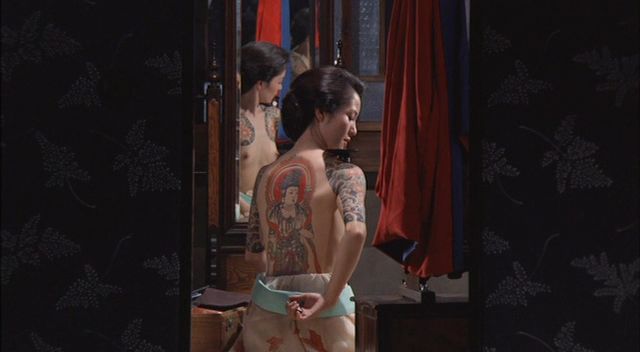
Kagero
Hideo Gosha - 1991
Panorama Entertainment Region 3 DVD
The second to last entry in Hideo Gosha's filmography, Heat Wave would appear to be a throwback to the yakuza films of the early Seventies, were it not for the various scenes of women baring their breasts. And with a cast that includes such stalwarts both of Japanese cinema and Gosha's previous films, Tatsuya Nakadai, and briefly, Tetsuro Tamba, it's as if Gosha was doing his own update of genre while paying tribute to the stars of the past.
The film mostly belongs to Kanako Higuchi as Rin, the itinerant gambler who returns home, with deadly consequences for all. The plot could well be the same for a western. Even though the action takes place in 1928, it is in a Japan that is still very traditional, even with the presence of trains and electricity. Orphaned as a young girl when her father is killed for cheating at a card game, Rin is adopted by a prosperous family that runs a large restaurant. Accidentally meeting up with her younger brother, ten years after leaving Kyushu, Rin finds herself returning home, playing a high stakes game with multiple connections to her past.
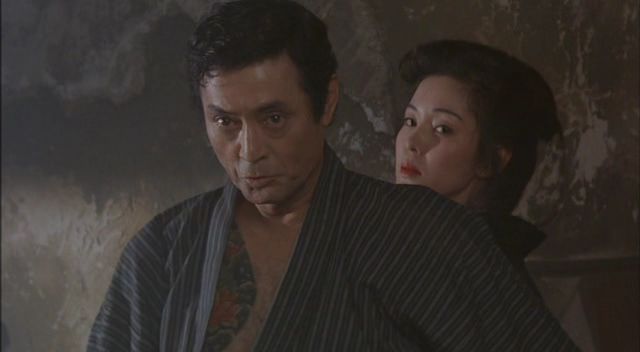
Gosha's opening shot is of Rin pouring water over herself, her tattooed bare back clearly seen. In her first scene with dialogue, Rin is standing with the extended, open palm, the classic scene of introduction found in most period yakuza movies. It may be no coincidence that Rin, who lives autonomously, is the one female character in the film that is still standing. This is not to say that Heat Wave is particularly feminist in design. The message, if one is to be found, is more nihilistic, suggesting that it is best not to invest too much in material or personal attachments.
I'm not sure what to make of one scene where the crime family that Rin confronts are introduced watching a live sex show. What appears to be a geisha and a tonsured male is revealed to be two women performing for the entertainment of their male patrons. Without making a "Pink Film", Gosha was known to push the envelope for his depiction of nudity in mainstream films during his last decade as a filmmaker. Even though it may have caused finger wagging from some critics, it kept Gosha commercially viable, and did nothing to keep Heat Wave from getting seven nominations from the Japanese Academy.
It's only been in the past few years that some of Gosha's films have been made available officially in the U.S. Most of the writing as centered on individual films. Writing for the Washington Post, Steohen Hunter is certainly not alone in seeing Gosha's films as westerns in eastern garb, although for myself, I see Goyokin (1969) as something of a riff mostly on Sergio Leone with an unexpected play on Hitchcock's The Birds on the side. Unlike most westerns, Heat Wave ends with the climatic battle happening indoors, in Rin's family mansion, with guns, knives and swords, while the place is on fire. And in classic yakaza tradition, Rin leaves in the same way that she first appears onscreen, alone.
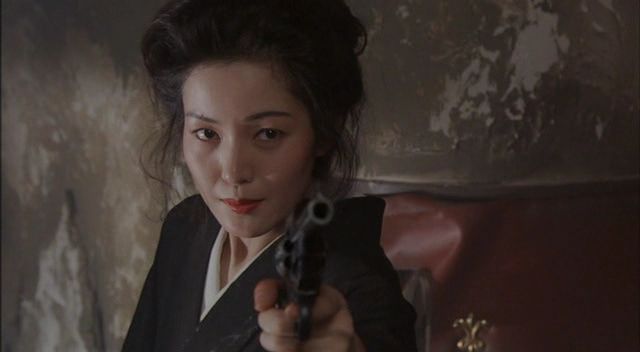
Posted by Peter Nellhaus at 07:50 AM
July 10, 2012
Twins of Evil

John Hough - 1971
Synapse Films Region 1 DVD
Looking beyond the eye candy, the single most striking key to Twins of Evil is Peter Cushing and the character that he plays. More gaunt than usual, Cushing portrays the leader of a group of men called "The Brotherhood" that seek out and kill women accused of being witches. While not necessarily intended, there are contemporary reverberations here, with a group of men using religious piety as their motivation to put to death women who may be independent and sexually active without marriage. There's an obvious thrill to running around with torches, and burning the women to death, a thrill that's amplified when the men find out that hunting vampires requires sharpened blades and wooden stakes with pointed tips. Cushing's character of Gustav Weil is dressed in black, as are the rest of his group. While not stated as such, it is suggest that the men are self-appointed Puritans who act as moral guardians in the community where the film takes place, the town of Karnstein, named after the family that lives in the big castle that overlooks the town, in a rather hazy, unspecific past.
What makes Weil different from the character Cushing is most associated with, Dr. Abraham Van Helsing, is that Hammer now allows ambivalence, so that Weill illustrates the old saying of the road to hell being paved with good intentions. What makes Twins of Evil of interest is not simply that the sex and blood suggested in earlier Hammer films was amplified in keeping with newly liberal production codes in the U.S. and U.K., but that the film reflects a world that is not so evenly split between good and evil.

Actually one of the twins might be considered evil. The twins are two orphans who come from Venice to live under the guardianship of their aunt and uncle. The uncle is witch hunter Gustav, while the Aunt Katy is the often ignored voice of reason. Maria is the goody goody who plays it safe following the house rules. Frieda isn't so much evil as much as she just wants to be bad, stay up late, go to parties, and let the men take long glances at her generous cleavage. Frieda seeks out the young and wealthy Count Karnstein after hearing rumors of his devil worshipping ways and decadence, representing everything opposite of Uncle Gustav. That it turns out that Karnstein is a vampire is an unexpected bonus.
For those who love classic movies, there's Kathleen Byron, best remembered for her two Powell-Pressburger films, Stairway to Heaven and Black Narcissus, as the wise Aunt Katy. It's almost shocking to know that Dennis Price, another Price-Pressborger veteran, was 56 at the time he made Twins of Evil, extremely overweight and prematurely aged by alcoholism.
As for the Collinson twins, their acting really can't be judged as they were dubbed to cover their Maltese accents. Various characters mention how much they look alike. Maybe it's light and make up, but it seems to me that Mary, who plays Maria, has a slightly wider nose and fuller lips. Madelaine is the twin who shows more skin, especially when trying to seduce Anton, more or less the hero here, played by David Warbeck.
The DVD supplement is especially useful in discussing the history of Hammer films at the time of production and the various elements that lead to the making of Twins of Evil. There's some humor in knowing that the producers were named Fine and Style, neither men known as being particularly fine or stylish. For those who may have seen Twins of Evil in its theatrical run, one gets to see what shots in the film were edited out either for the British or U.S. release versions. One of the deleted shots was of a close up of a woman's hand stroking a long, lit candle. The scene in question takes place when Count Karstein is turned into a vampire by a newly revived member of the undead, a beautiful blonde. Which is all well and good except that this gorgeous vampire is Count Karstein's great grandmother, or some kind of relative, so it's probably just as well that we never see what the two are actually doing together. Talking about making the film are director John Hough and Damien Thomas, the film's Count Karstein. Among the film scholars adding their thoughts are Joe Dante, Tim Lucas, Kim Newman and Christopher Frayling. Those with Blu-ray players can enjoy some extra bonuses.
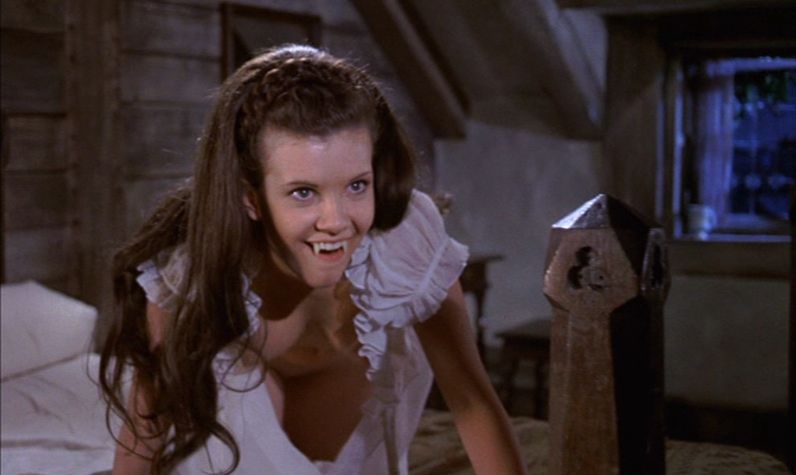
Posted by Peter Nellhaus at 08:13 AM
July 08, 2012
Pay or Die

Richard Wilson - 1960
Warner Archives Region 0 DVD
Pay or Die marks something of a anomaly in Ernest Borgnine's long career as being one of the very few films where he was both the top billed star and a romantic lead. And as leading men go, only Gene Evans smooching Mary Welch in Sam Fuller's Park Row may have been more unusual. For a lot of guys watching this film, there might have been a flicker of encouragement to see Zohra Lampert choose Borgnine over the more conventionally handsome Alan Austin.
In other ways, Pay or Die is a bit more conventional, though it has its moments. Coming in after Al Capone, Richard Wilson's film lacks the visual punch of the previous film, nor is David Raksin's score memorable in the jangly, atonal ways that mark his work with the earlier film, or the later Invitation to a Gunfighter. Every once in a while there are reminders that the budget for a major production from Allied Artists was less than allocated for some of the smaller films from the major studios. On the plus side, with cinematographer Lucien Ballard, Wilson demonstrates lessons gained from working with Orson Welles especially in his staging of scenes with extended dialogue. The film is also blessed with a cast of character actors with the kind of faces perfect for playing mugs, thugs and lugs.

Borgnine, Lucien Ballard and Richard Wilson
The film is a fictionalized account of police officer Joe Petrosino during the years from 1906 through 1909. Taking place primarily in the "Little Italy" section of New York City, the story is about the conflict between the protection rackets run by Sicilian gangsters and Petrosino's attempts to fight what became known as the Mafia. The film is also about the conflicts that still continue to persist in various forms, between older cultures and codes of behavior for immigrants in the United States. Petrosino's task is not only to curtail criminal activity but to prove that, for a people who distrust legal authority, that the police are their allies, as well as proving the possibility of making it in America, and demonstrating the capability of people among this new wave of immigrants.
What also makes Borgnine's role unusual is that it is not as dependent on the physical trademarks most exploited in other films. The famous gap toothed grin is absent save for one scene with Lampert where the pair establish mutual interest in each other. Borgnine also isn't called upon to exert his burly presence as he would have done in something previously like From Here to Eternity, or later as in The Emperor of the North Pole. Borgnine engages in gunfire, and in one scene carries a thug down the tenement stairs and into a garbage can, but for the better part of the film, plays a man more reliant on brains than brawn. Unlike the real wife of Joe Petrosino, Zohra Lampert was twenty years younger than Borgnine. Not the most gorgeous of women playing opposite Borgnine (that would be Stella Stevens in The Poseidon Adventure), Lampert quiet attractiveness works best in her own shy wooing of Borgnine.
Wilson's Wellesian touches are mostly to be seen during the night scenes, playing with darkness and shadows, such as a when Zohra Lampert is chased down an empty street by two gimps, and behind the theater where a thug has hidden a bomb inside Enrico Caruso's limosine. Wilson succeeds in creating some very real tension in another scene involving a bomb hidden in a horse drawn wagon, cross cutting between the wagon and several different characters in the vicinity of Mulberry Street. Another moment, perhaps created for the film because of the mental imagery invoked, involves some gangster locking a would be victim, a baker, into an as yet unlit oven. Richard Wilson's career as a director seems to exist in the shadows of Hollywood and film history, yet as some more of his eight features come more readily available for viewing, the evidence is shows certain, if uneven, talent.
Posted by Peter Nellhaus at 05:39 PM | Comments (1)
Coffee Break

Ryan Gosling in Drive (Nicolas Winding Refn - 2011)
Posted by Peter Nellhaus at 08:34 AM
July 05, 2012
The True Story of a Woman in Jail: Continues

Zoku jitsuroku onna kanbetsusho
Kuyo Ohara - 1975
Impulse Pictures Region 1 DVD
This is how I like Nikkatsu Roman Porno - with one foot, OK, maybe a big toe, in old school filmmaking, and an abundance of naked women. Some might call the nudity gratuitous, but I say that's the whole point of making a women in prison movie. Like the first film in the series, this entry begins and ends with an enka, a ballad about the travails of being a woman in trouble. This is in keeping with the tradition of Nikkatsu's youth oriented films from the Fifties and early Sixties, to be found in something like Tokyo Drifter, with the song usually performed by the star.
As far as I'm concerned, the best reason to see True Story . . . Continues is for star Hitomi Kazue. Relatively tall for a Japanese woman, and lean, Kazue provides an unforgettable presence. One might describe the character she plays, Mayumi, as the female equivalent to the lone wolf kind of guy often associated with Toshiro Mifune or Ken Takakura in male centered action films. Well, yes, she's hot, but she's one of the few actresses of "Pink Films" that easily commands attention, even when she's fully dressed.

Director Koyu Ohara doesn't waste time in giving the audience what it wants. After the title song, the first image is of several female prisoners parading nude for inspection. There are also a couple of bathing scenes, lesbian orgies and cat fights, in short, the reasons why some of us love women in prison movies. There's also some straight sex, but the guys aren't exactly attractive, and the heterosexual activity comes in the form of rape or as part of a quid pro quo arrangement. All things considered, the girl on girl action might be sleazy, but it's a higher variety of sleaze.
Ohara has a couple of nice moments during a flashback. Mayumi and her mother are walking through some very tall grass. When the mother is abducted by a group of young men intent on raping her, we just see an umbrella tossed in the air from a short distance. Following the rape of mother and daughter, Mayumi is standing in a stream, her clothing torn, splashing water on her legs. Maybe to describe this as junior grade Mizoguchi might be something of an exaggeration, but there is the suggestion that Ohara knows his classics.
I am, of course, hoping that the third film of this series will be on DVD soon. In the meantime, while the quality of the Nikkatsu Roman Porno films is admittedly mixed, I always find it worth my time to see for myself the best in the genre, whether it's a director like Kuyo Ohara inserting a few moments of inspired artistry, or admiring the beauty of an actress like Hitomi Kazue.

Posted by Peter Nellhaus at 07:50 AM
July 03, 2012
Zoom In: Sex Apartments

Zumu in: Boko danchi
Naosuke Kurosawa - 1980
Impulse Pictures Region 1 DVD
This is one of those times when I have to wonder what the people making this film were thinking. And was there anyone who found Zoom In: Sex Apartments entertaining? Whatever director Naosuke Kurosawa and writer Chiho Katsura were intending regarding sexual fantasy seems lost amidst an ugly display of misogyny.
What exists of a narrative is of young housewife Saeko, following a quickie with her horny, if sexually clumsy husband, bicycling to a tryst with her long time lover, Takaya. On the way, Saeko is knocked off her bike and raped by an unknown man dressed in black, with black gloves, who threatens her with a long, pointed awl. Strangely enough, Takaya is dressed the same way, and as a piano tuner, has a similar looking, sharp instrument. Around the apartment complex where Saeko lives, young women are attacked, with the attacker often burning the women alive, lighting up the pubic area. All clues seem to lead to Saeko's lover.

The last ten minutes or so point towards the film to be understood on a more metaphorical level leading to a scene of Saeko perhaps being raped in Hell. There is clearly the influence of Dario Argento at work here, yet the scenes of sex are not particularly erotic, nor are any of the thriller aspects suspenseful. There are what seem to be clues thrown out, such as a small child's piano and a slashed painting, yet they are not accorded any significance. It's never explained why Takayo keeps the toy piano hidden in his closet, or who slashed the painting. The one moment that is an interesting touch is when one of the assailant's victims, a schoolgirl, is suppose to be running away, but is shown running in place, while the lights to the apartments shut off while she calls for help.
It may be worth mentioning that screenplay writer Chiho Katsura's best known credit is for House, a decidedly better work of dream logic. In addition to writing films for Nobuhiko Obayashi, Karsura also wrote Queen Bee for Kon Ichikawa. That Katsura has worked on better films with better filmmakers makes the ill conceived screenplay here more distressing.
There is little to be found on star Erina Miyai outside of this English language filmography. A reasonably attractive woman, her most erotic moment is not when engaged with her husband, her lover Takaya, or her female lover Sachi, but alone, applying lipstick in an extreme close up.

Posted by Peter Nellhaus at 08:15 AM
July 01, 2012
Coffee Break

Martine Carol in Nana (Christian-Jacques - 1955)
Posted by Peter Nellhaus at 08:57 AM